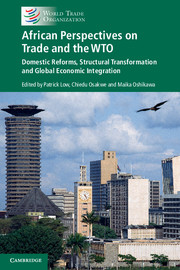 African Perspectives on Trade and the WTO
African Perspectives on Trade and the WTO from Part III - Selected Development Experiences and Perspectives
Published online by Cambridge University Press: 27 October 2016
This chapter evaluates the impact on competitiveness of reforms undertaken by recently acceded countries and draws lessons for African countries pursuing the goal of becoming emerging economies. By comparing reform outcomes before and after accessions relative to control groups using the difference-in-difference evaluation method, the chapter concludes that the recently acceded members improved their international competitiveness, although the overall impact was relatively small and differed substantially across economies, economic sectors and time. African economies aspiring to become emerging economies could build on the experience of recently acceded countries by designing long-term reform agendas similar to the accession reform packages, locking them into a credible policy framework through a series of domestic and international agreements, frontloading reforms to gain credibility and persisting in their implementation, balancing short-term costs with long-term benefits and learning from Article XII peers who have gained substantial experience in managing complex reforms.
To save this book to your Kindle, first ensure [email protected] is added to your Approved Personal Document E-mail List under your Personal Document Settings on the Manage Your Content and Devices page of your Amazon account. Then enter the ‘name’ part of your Kindle email address below. Find out more about saving to your Kindle.
Note you can select to save to either the @free.kindle.com or @kindle.com variations. ‘@free.kindle.com’ emails are free but can only be saved to your device when it is connected to wi-fi. ‘@kindle.com’ emails can be delivered even when you are not connected to wi-fi, but note that service fees apply.
Find out more about the Kindle Personal Document Service.
To save content items to your account, please confirm that you agree to abide by our usage policies. If this is the first time you use this feature, you will be asked to authorise Cambridge Core to connect with your account. Find out more about saving content to Dropbox.
To save content items to your account, please confirm that you agree to abide by our usage policies. If this is the first time you use this feature, you will be asked to authorise Cambridge Core to connect with your account. Find out more about saving content to Google Drive.